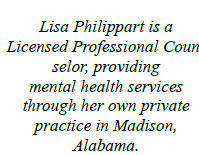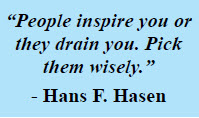 By: Lisa Philippart
By: Lisa Philippart
In my previous article, we discussed three ways of handling other people’s negative emotions: Treating emotions as a puzzle rather than a problem, trying some reverse empathy, and being a mirror, not a mechanic. I have two more suggestions of ways to manage others’ bad moods.
One of the hardest things about other people’s bad moods is the emotions they stir up in us. For example, your spouse is sad and melancholy, so you get frustrated. Or your boss is stressed and overbearing, so you get anxious too. The trouble is that once you are deep in the spiral of your own difficult emotions, it’s hard to have enough mental and emotional bandwidth to navigate both your own mood and that of someone else. This is why we often end up reacting to people’s moods in a way that isn’t helpful to them, us, or the relationship. The solution is to get better at noticing and managing our own emotional responses early so they don’t balloon out of control. And the best way to do that is through a process called emotional validation.
 Emotional validation simply means acknowledging our own emotions and reminding ourselves that they’re okay and reasonable, even if uncomfortable. For example, suppose your partner has been upset all evening about an incident at work. While you’ve been able to tolerate it for the past couple of hours, you feel yourself getting annoyed with them. Rather than acting on this annoyance and saying something unhelpful, or becoming judgmental of yourself for feeling annoyed, you could validate your own annoyance. You could pause, acknowledge your feelings, remind yourself that it’s okay to feel that way, and then ask yourself what the most helpful way to move forward might be.
Emotional validation simply means acknowledging our own emotions and reminding ourselves that they’re okay and reasonable, even if uncomfortable. For example, suppose your partner has been upset all evening about an incident at work. While you’ve been able to tolerate it for the past couple of hours, you feel yourself getting annoyed with them. Rather than acting on this annoyance and saying something unhelpful, or becoming judgmental of yourself for feeling annoyed, you could validate your own annoyance. You could pause, acknowledge your feelings, remind yourself that it’s okay to feel that way, and then ask yourself what the most helpful way to move forward might be.
 And finally, another pitfall I see others make when trying to deal with people’s bad moods is to overextend their responsibility to that person to include how they feel. We can only be responsible for things that we can control. And because we can’t control emotions directly, we aren’t responsible for them…either our own or those of other people. However, we are responsible for our actions, for how we choose to think and behave. When we assume responsibility for things beyond our control, we set ourselves up for unnecessary frustration, disappointment, and resentment. On the other hand, when we are clear about what we actually can control and therefore have responsibility for, we are able to deploy our efforts and resources as effectively as possible. So much unnecessary struggle, conflict, and wasted energy comes from a fundamental misunderstanding about what’s really under our control. It’s amazing how much genuinely helpful energy gets freed up when you remove the burden of excess responsibility from yourself. When you stop expecting to be able to make someone feel better, you can start taking real steps to connect with that person in a heartfelt way and be genuinely supportive.
And finally, another pitfall I see others make when trying to deal with people’s bad moods is to overextend their responsibility to that person to include how they feel. We can only be responsible for things that we can control. And because we can’t control emotions directly, we aren’t responsible for them…either our own or those of other people. However, we are responsible for our actions, for how we choose to think and behave. When we assume responsibility for things beyond our control, we set ourselves up for unnecessary frustration, disappointment, and resentment. On the other hand, when we are clear about what we actually can control and therefore have responsibility for, we are able to deploy our efforts and resources as effectively as possible. So much unnecessary struggle, conflict, and wasted energy comes from a fundamental misunderstanding about what’s really under our control. It’s amazing how much genuinely helpful energy gets freed up when you remove the burden of excess responsibility from yourself. When you stop expecting to be able to make someone feel better, you can start taking real steps to connect with that person in a heartfelt way and be genuinely supportive.

Bad moods and painful emotions are hard to handle, both in ourselves and in the people around us. While it’s not possible to fix another person’s emotional struggles, there are a handful of practical skills you can learn to help you be effectively sympathetic and reassuring. Even if you fail to help the other person, skills like emotional validation and reflective listening will help you stay calm instead of reactive in the face of other people’s bad moods.
By: Lisa Philippart,
Licensed Professional Counselor









 June 20, 2025
June 20, 2025



